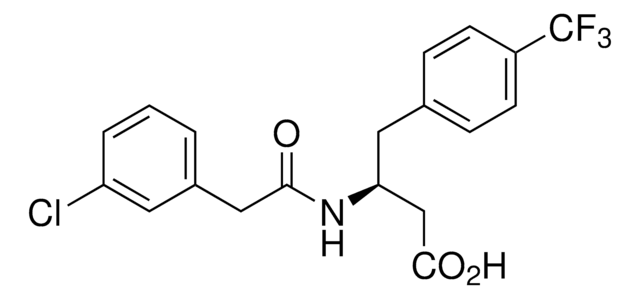371725
GPR43 (FFA2) Agonist
The GPR43 (FFA2) Agonist controls the biological activity of GPR43. This small molecule/inhibitor is primarily used for Biochemicals applications.
Synonyma:
GPR43 (FFA2) Agonist, (S)-2-(4-chlorophenyl)-3,3-dimethyl-N-(5-phenylthiazol-2-yl)butanamide
Přihlásitk zobrazení cen stanovených pro organizaci a smluvních cen
About This Item
Empirický vzorec (Hillův zápis):
C21H21ClN2OS
Číslo CAS:
Molekulová hmotnost:
384.92
UNSPSC Code:
51111800
NACRES:
NA.77
Doporučené produkty
Quality Level
assay
>98% (HPLC)
form
solid
manufacturer/tradename
Calbiochem®
storage condition
OK to freeze
color
white
solubility
DMSO: 50 mg/mL
shipped in
ambient
storage temp.
2-8°C
General description
A phenylacetamide compound that acts as an allosteric agonist of FFA2 (GPR43), demonstrating a left-shifted acetate dose response (IC50 = 0.7 µM) and 111% efficacy relative to acetate in hFFA2 forskolin-induced cAMP assays.
Warning
Toxicity: Standard Handling (A)
Reconstitution
Following reconstitution, aliquot and freeze (-20°C). Stock solutions are stable for up to 3 months at -20°C.
Other Notes
Wang, Y., et al. 2009. Bioorg. Med. Chem. Lett.20, 493.
Legal Information
CALBIOCHEM is a registered trademark of Merck KGaA, Darmstadt, Germany
Storage Class
11 - Combustible Solids
wgk_germany
WGK 3
flash_point_f
Not applicable
flash_point_c
Not applicable
Osvědčení o analýze (COA)
Vyhledejte osvědčení Osvědčení o analýze (COA) zadáním čísla šarže/dávky těchto produktů. Čísla šarže a dávky lze nalézt na štítku produktu za slovy „Lot“ nebo „Batch“.
Již tento produkt vlastníte?
Dokumenty související s produkty, které jste v minulosti zakoupili, byly za účelem usnadnění shromážděny ve vaší Knihovně dokumentů.
Sandra M Holmberg et al.
Nature communications, 15(1), 3502-3502 (2024-04-26)
Beneficial gut bacteria are indispensable for developing colonic mucus and fully establishing its protective function against intestinal microorganisms. Low-fiber diet consumption alters the gut bacterial configuration and disturbs this microbe-mucus interaction, but the specific bacteria and microbial metabolites responsible for
Signe Schultz Pedersen et al.
The FEBS journal, 291(3), 566-583 (2023-11-21)
Butyrate, a gut microbial metabolite, has beneficial effects on glucose homeostasis and has become an attractive drug candidate for type 2 diabetes (T2D). Recently, we showed that butyrate protects pancreatic beta cells against cytokine-induced dysfunction. In this study, we explored
Anne Ørgaard et al.
Islets, 11(5), 103-111 (2019-08-31)
The intestinal microbiota has been demonstrated to influence host metabolism, and has been proposed to affect the development of obesity and type 2 diabetes (T2D), possibly through short-chain fatty acids (SCFAs) produced by fermentation of dietary fiber. There are some
Bandik Föh et al.
PloS one, 17(3), e0266071-e0266071 (2022-03-26)
The microbially-derived short-chain fatty acid butyrate is a central inhibitor of inflammatory innate and adaptive immune responses. Emerging evidence suggests that butyrate induces differentiation of IL-10-producing (IL-10+) regulatory B cells. However, the underlying mechanisms of butyrate-driven modulation of B cell
Guangwen Wang et al.
Journal of virology, 94(2) (2019-11-07)
Influenza A virus (IAV) coopts numerous host factors to complete its replication cycle. Here, we identify free fatty acid receptor 2 (FFAR2) as a cofactor for IAV entry into host cells. We found that downregulation of FFAR2 or Ffar2 expression
Náš tým vědeckých pracovníků má zkušenosti ve všech oblastech výzkumu, včetně přírodních věd, materiálových věd, chemické syntézy, chromatografie, analytiky a mnoha dalších..
Obraťte se na technický servis.


![Poly[(R)-3-hydroxybutyric acid] natural origin](/deepweb/assets/sigmaaldrich/product/structures/129/476/7d1c924b-f644-4889-a2d6-d7a923ce382c/640/7d1c924b-f644-4889-a2d6-d7a923ce382c.png)



